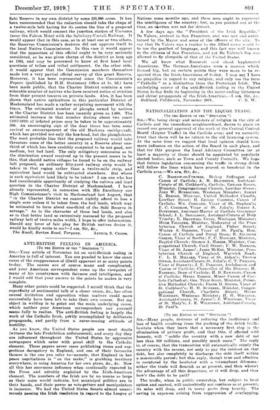ANTI-BRITISH FEELING IN AMERICA. [To THE EDITOR OF THE "SPECTATOR.")
SIR,—Your article of November 1st on anti-British feeling in America is full of interest. You are puzzled to know the exact cause of the reappearance of illwill apparent at so many points to-day. The causes are of course many and complicated, and your American correspondent sums up the viewpoint of many of his countrymen with fairness and intelligence, and
I would add that your answer to the points he makes is very complete.
Many other points could be suggested. I myself think that the superfluity of sentimental talk of a closer union, &c., has often caused irritation and opposition when matters could more successfully have been left to take their own course. But my object in writing is to point out the main underlying cause, which neither your American correspondent nor yourself seems fully to realize. The anti-British feeling is largely the work of the Catholic Irish, pak.tly accomplished by deliberate propaganda, and partly from a never-ceasing attitude of hostility.
As you know, the United States people are most docile (witness the late Prohibition enforcement), and every day they are influenced throughout the United States by aggressive newspapers which cater with great skill to the Catholic element. These papers never cease publishing items and sug- gestions derogatory to England, and one of their favourite themes is the one you refer to—namely, that England in her peace negotiations is " on the make," is grabbing territory everywhere, is using America for her own plans, &c., &c. Now all this has enormous influence when continually repeated in the Press and adroitly exploited by the Irish-American element. The numbers of the Irish are by no means as large as their noise would indicate, but municipal politics are in their hands, and their power as vote-getters and manipulators is immense. We had the United States Senate almost unani- mously passing the Irish resolution in regard to the League of Nations some months ago, and these men ought to represent the intelligence of the country; but, as you pointed out at the time, an election was not far distant.
A few days ago the " President of the Irish Republic," De Valera, arrived in San Francisco, and was met and enter- tained by the Mayor and some of the officers of the city. To say that De Valera was a traitor to the Allied cause would be to use the gentlest of language, and this fact was well known to the citizens of San Francisco, and yet Do Valera's flag was allowed to fly alongside of that of the United States:.
We all know what Roosevelt said about hyphenated Americans. The German-Americans were a menace which loomed big, but on certain points they were more to be re- spected than the Irish-Americans of to-day. I may say I have no prejudice in regard to any religion, and only use the term " Catholic " as a distinction from the Protestant Irish. The underlying source of the anti-British feeling in the United States to-day finds its beginning in the never-ending bitterness and clever propaganda of the Irish-American.---I ant, Sir, &e.,
Oakland, California, November 20th. C. B. W.


























 Previous page
Previous page